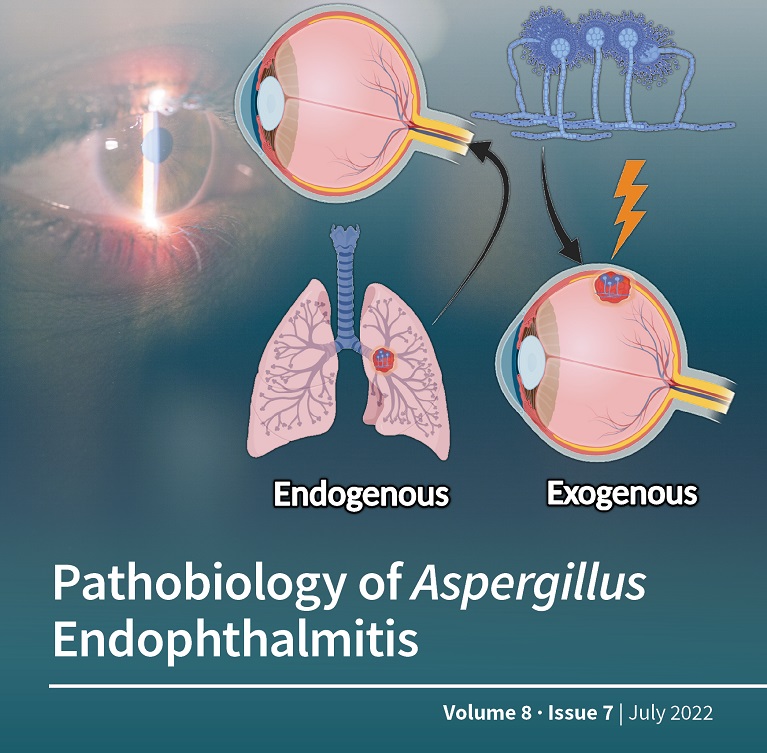The research of former and current Wayne State University School of Medicine students working in the laboratory of Ashok Kumar, Ph.D., associate professor of Ophthalmology, Visual and Anatomical Sciences, is featured on the cover of the Journal of Fungi, a peer-reviewed academic journal covering the field of microbiology. 
Alisha Khambati, M.D.’22, Mamta Kanwar, M.D. ’18 and the Class of 2025’s Alejandro Sepulveda contributed to “Aspergillus Endophthalmitis: Epidemiology, Pathobiology, and Current Treatments,” published in the Journal of Fungi. The article discusses recent advancements in the diagnosis and treatment of the disease, which is most often caused by surgical complications or eye trauma, and can cause blindness.
There are several infectious diseases that can affect the eye health. However, the chances of blindness increase with those affecting the retina, such as endophthalmitis.
“Fungal infections of the eye are a rising global issue,” said study co-author Pranatharthi Chandrasekar, M.D., chief of WSU Infectious Diseases and professor of Internal Medicine. “New information our article provides expands the knowledge and provides insights into optimal methods of management.”
Dr. Kumar’s laboratory focuses on understanding the pathobiology of endophthalmitis. While fungal pathogens pose little risk to most healthy people, immunocompromised individuals are more prone to develop fungal infections with high mortality rates. Poor therapeutic outcomes and growing antifungal resistance pose further challenges for treatments.
In addition to the review authors, medical student Cecilly Kelleher, Class of 2025, is also working in Dr. Kumar’s lab.
“Apart from leading an active National Institutes of Health-funded research program, I truly enjoy teaching and mentoring medical students. Several of my former medical students who participated in our research successfully matched in their desired specialty, mainly Ophthalmology.” Dr. Kumar said. “I think exposure to research during medical school is key to developing their scientific acumen as they transition to their respective residency programs.”
Dr. Khambati is now a resident in her transitional year in a Detroit Medical Center program before starting her Ophthalmology residency at Wayne State’s Kresge Eye Institute.
“Perseverance and communication. These are two key components I learned through the journey of this article. It took almost two years to synthesize information from 150-plus references, showcasing the needed patience, teamwork with co-authors and strong mentorship from Dr. Ashok Kumar. It has been a very humbling experience, and by God’s grace our article made it to the journal cover.” Dr. Khambati said. “As a current Ophthalmology resident, it makes me appreciate the significance of our study, as it’s vital to understand pathobiology and therapeutic strategies to better serve our patients and aid in their visual prognosis.”
To those interested in starting research or are in the early phases of a project, Dr. Khambati’s best advice is “to not give up. There are many instances when unexpected hurdles can arise, but with great mentorship and perseverance you will succeed. A huge thank you to Dr. Kumar and all the co-authors for being a part of this incredible experience.”
Her article colleague, Dr. Kanwar, completed her Ophthalmology residency at the Kresge Eye Institute and is now engaged in a glaucoma fellowship at the Doheny Eye Institute of University of California Los Angeles.
“Overall, the diagnosis of endophthalmitis is very challenging, especially those caused by fungi. We often rely on microbiology culture reports to initiate antimicrobial therapy. Unfortunately, 40% to 50% of endophthalmitis cultures come out negative. Similar challenges arise in the management of ocular fungal infections, as we have limited choices of antifungal agents,” Dr. Kanwar said “Thus there is unmet need to diagnose and treat these potentially blinding infectious diseases.”
Moving forward, Drs. Kumar and Chandrasekar plan to develop a consortium of microbiologists, ophthalmologists and infectious diseases specialists. The multi-disciplinary team is essential to better understand the pathobiology of ocular infections, and developing new diagnostic and therapeutic strategies, they said.